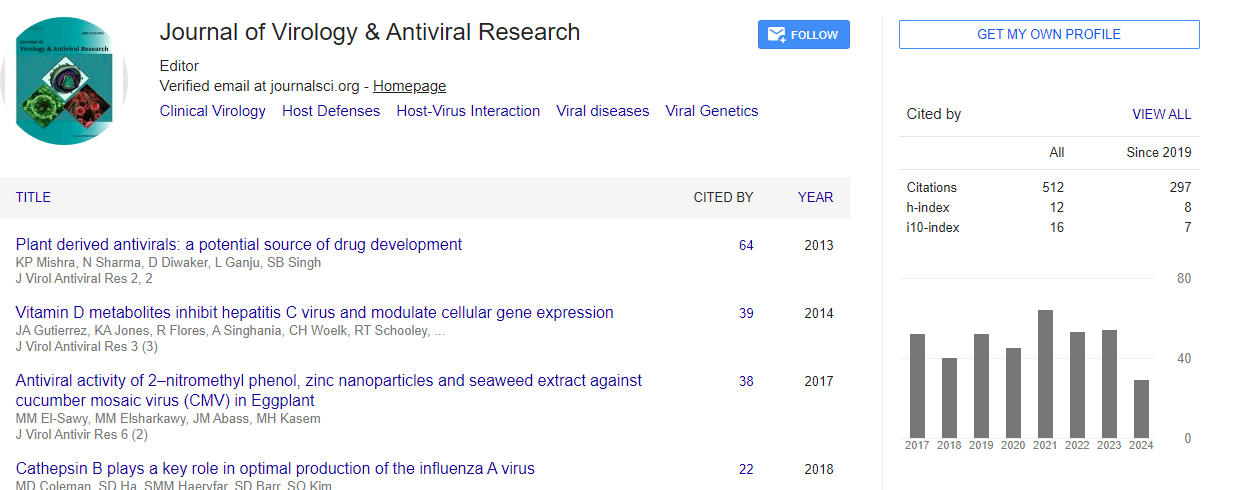Short Communication, J Virol Antivir Res Vol: 9 Issue: 2
Short Note on Hepatitis
Mounica Merihelan*
Department of Microbiology, Andhra University, India
*Corresponding Author: Mounica Merihelan
Department of Microbiology, Andhra University, India
E-mail: mounicamerihelan@gmail.com
Received: July 10, 2020 Accepted: July 20, 2020 Published: July 27, 2020
Citation: Mounica M (2020) Short Note on Hepatitis. J Virol Antivir Res 9:2. doi: 10.37532/jva.2020.9(2)197
Abstract
Hepatitis refers to inflammation of the liver. Inflammation is irritation of tissues or injury that typically leads to swelling and it will cause pain. There square measure 3 most vital sorts of infectious disease, and every one sorts of infectious disease square measure affected on human liver. a number of the symptoms square measure similar, however they need totally different treatments
Keywords: Hepatitis A, Hepatitis B, Hepatitis C, Chronic infectious, Hepatoma massive killer
Hepatitis A
This virus can dig from intake or drinking one thing that is got the virus in it and this kind of virus cannot take permanent infection to physical body and frequently does not cause any complications. Your liver heals in concerning two months. you'll forestall it with a vaccinium
Hepatitis B
Most of the individuals heal from this kind of virus among six months. Sometimes, though, it causes a long infection that may cause liver harm. Once you've the sickness, you'll unfold the virus although you do not feel sick. You will not catch it if you get a vaccine. it's sex with somebody who's infected with hepatitis B and Share dirty needles once victimization banned medication. Have direct contact with infected blood or the body fluids of somebody who's got the sickness. If you are pregnant and you've got hepatitis B, you may provide the sickness to your unborn kid. If you deliver a baby who's got it, he must get treatment within the initial twelve hours when birth
Hepatitis B is caused by the hepatitis B virus, an animal virus that may cause each acute and chronic infectious disease. Chronic infectious disease develops within the V-J Day of adults United Nations agency square measure unable to eliminate the virus when associate initial infection. Known ways of transmission embrace contact with blood, transfusion (now rare), unhealthful tattoos, sex (through sexuality or contact with bodily fluids), or mother-to-child by breast feeding; there's bottom proof of placental crossing. However, in concerning 1/2 cases the supply of infection cannot be determined. Blood contact will occur by sharing syringes in endovenous drug use, shaving accessories like razor blades, or touching wounds on infected persons. Needle-exchange programmers are created in several countries as a sort of hindrance
Patients with chronic hepatitis B have antibodies against the virus, however not enough to clear the infected liver cells. The continuing production of virus and countervailing antibodies could be a seemingly reason behind the immune advanced sickness seen in these patients. A vaccinium is offered to stop infection for all times. hepatitis B infections lead to five hundred,000 to 1,200,000 deaths per annum worldwide because of the complications of chronic infectious disease, cirrhosis, and malignant hepatoma. hepatitis B is endemic during a variety of (mainly South-East Asian) countries, creating liver disease and malignant hepatoma massive killers. There square measure eight treatment choices approved by the U.S. Food and Drug Administration (FDA) offered for persons with a chronic hepatitis B infection: interferon, pegylated antiviral, adefovir, entecavir, telbivudine, lamivudine, tenofovir disoproxil and tenofovir alafenamide with a sixty fifth rate of sustained response
Hepatitis C
This kind of virus cannot show symptoms out. concerning eightieth of these with the sickness get a long infection. It will generally result in liver disease of the liver and a harm of the liver. there is not any vaccinium to stop it. If you had a transfusion before new screening protocols were place in situ in 1992, you're in danger for hepatitis C. If not, the blood employed in transfusions these days is safe. It gets checked beforehand to form certain it's freed from the virus that causes hepatitis B or C.
Symptoms of hepatitis
The most common symptoms for all 3 varieties are:
Dark urine
Stomach pain
Yellowing of skin or eyes
Pale or clay-colored stool
Low-grade fever
Loss of craving
Fatigue
Feeling sick to the abdomen
Lack of nutrition.
 Spanish
Spanish  Chinese
Chinese  Russian
Russian  German
German  French
French  Japanese
Japanese  Portuguese
Portuguese  Hindi
Hindi 

